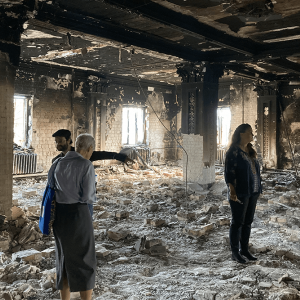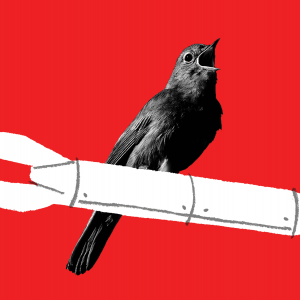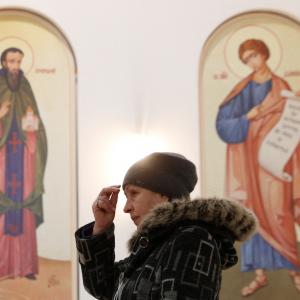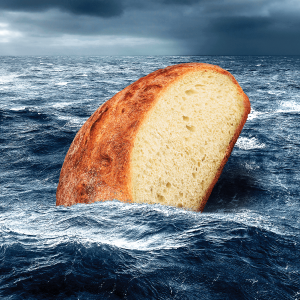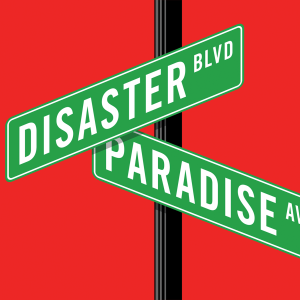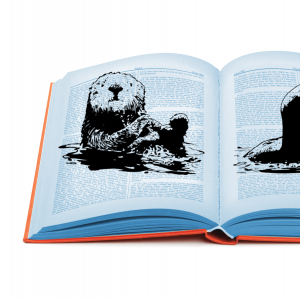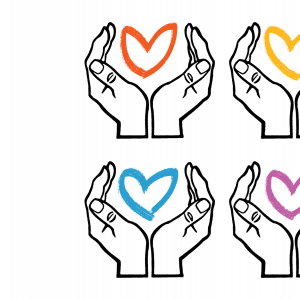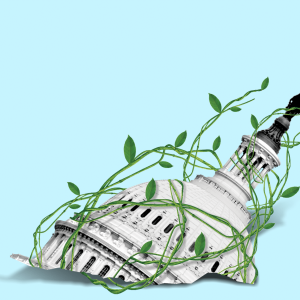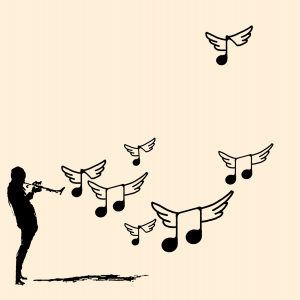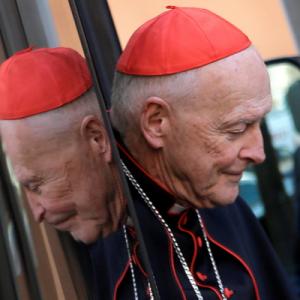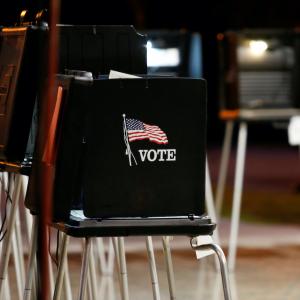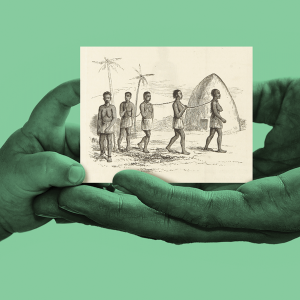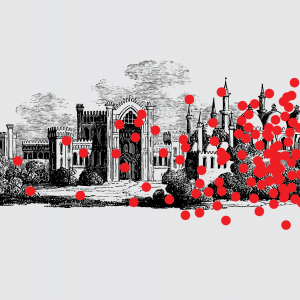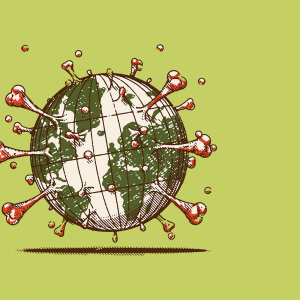
Rose Marie Berger is a Catholic peace activist and poet. She has been on Sojourners staff since 1986, and worked for social justice movements for 40 years. Rose has rooted herself with Sojourners magazine and ministry. She has written hundreds of articles for Sojourners and other publications and is a sought after preacher and public speaker. After living in Washington, D.C., for 35 years, she moved to Oak View, Calif., in 2022.
Rose’s work in Christian nonviolence has taken her to conflict zones around the world. She is active in the Catholic Nonviolence Initiative, a project of Pax Christi International, and served as co-editor for Advancing Nonviolence and Just Peace in the Church and the World, the fruit of a multiyear, global, participatory process to deepen Catholic understanding of and commitment to Gospel nonviolence. Her poetry has appeared in the books Watershed Discipleship: Reinhabiting a Bioregional Faith and Practice and Buffalo Shout, Salmon Cry: Conversations on Creation, Land Justice, and Life Together. She is author of Bending the Arch: Poems (2019), Drawn By God: A History of the Society of Catholic Medical Missionaries from 1967 to 1991 (with Janet Gottschalk, 2012), and Who Killed Donte Manning? The Story of an American Neighborhood. She has also been a religion reviewer for Publishers Weekly and a Huffington Post commentator. Her work has appeared in National Catholic Reporter, Publishers Weekly, Religion News Service, Radical Grace-Oneing, The Merton Seasonal, U.S. Catholic, and elsewhere. She serves on the board of The International Thomas Merton Society.
With Sojourners, Rose has worked as an organizer on peace and environmental issues, internship program director, liturgist, community pastor, poetry editor, and, currently, as a senior editor of Sojourners magazine, where she writes a regular column on spirituality and justice. She is responsible for the Living the Word biblical reflections on the Revised Common Lectionary, poetry, Bible studies, and interviews – and oversees the production of study guides and the online Bible study Preaching the Word.
Rose has a veteran history in social justice activism, including: leading the first international, inter-religious peace witness into Kyiv, Ukraine, following the outbreak of war in 2022, organizing inter-religious witness against the Keystone XL pipeline; educating and training groups in nonviolence; leading retreats in spirituality and justice; writing on topics as diverse as the “Spiritual Vision of Van Gogh, O'Keeffe, and Warhol,” the war in the Balkans, interviews with Black activists Vincent Harding and Yvonne Delk, the Love Canal's Lois Gibbs, and Mexican archbishop Ruiz, cultural commentary on the Catholic church and the peace movement, reviews of movies, books, and music.
Rose Berger has taught writing and poetry workshops for children and adults. She’s completed her MFA in poetry through the University of Southern Maine’s Stonecoast program. Her poetry has been published in Sojourners, The Other Side, Radix and D.C. Poets Against the War.
Rose grew up in the Central Valley of California, located in the rich flood plains of the Sacramento and American rivers. Raised in radical Catholic communities heavily influenced by Franciscans and the Catholic Worker movement, she served for nine years on the pastoral team for Sojourners Community Church; five as its co-pastor. She directed Sojourners internship program from 1990-1999. She is currently a senior editor and poetry editor for Sojourners magazine. She has traveled throughout the United States, and also in Ukraine, Israel/Palestine, Costa Rica, the Netherlands, Northern Ireland, Bosnia, Kosova, Peru, Colombia, Venezuela, and El Salvador visiting primarily with faith communities working for peace in situations of conflict.
Rose was born when atmospheric CO2 was at 319.08 ppm and now lives with her wife Heidi Thompson in Oak View, Calif., in the Ventura River watershed on traditional Chumash lands. Learn more at rosemarieberger.com.
Rose’s articles include:
- Pursuing the Secret of Joy: What is joy when it's not promiscuously tied to happiness, Hallmark, or hedonism?
- Why Our Faith Delegation went to Ukraine?: Our public message was simple: “We have come to Kyiv in solidarity to pray for a just peace.”
- Nonviolence in Najaf?: Will we recognize an Islamic peace movement when we see it?
- Of Love's Risen Body: The poetry of Denise Levertov, 1923-1997
- Glimpses of God Outside the Temple: The spiritual vision of Vincent Van Gogh, Georgia O'Keefe, and Andy Warhol.
- Damnation Will Not Be Televised: Almost everything I know about hell I learned from watching Buffy the Vampire Slayer
Speaking Topics
- Christian nonviolence, peace, war
- Catholic Nonviolence Initiative
- Climate change, creation care, watershed discipleship
- Bible study, liturgical year
- Poetry
- Spirituality and social justice
- Any topic covered in Sojourners magazine
- Catholicism
Speaking Format
- Preference for virtual events, but willing to discuss in-person events on case-by-case basis
Posts By This Author
‘Before God There Are Yet Other Languages Than Those of Words'
DEEP IN OLYMPIC National Park in Washington is the quietest place in the United States. In 2005, one square inch of Hoh Rain Forest—marked by a small red stone—was designated for sound protection.
The logic is simple, according to acoustic ecologist Gordon Hempton: If anthropogenic (human-caused) noise can impact many square miles, as scientists have observed, then a natural point of silence, protected from such sound, can also impact many square miles around it.
Preserving natural silence and setting limits on our human sonic footprint, on land and underwater, is a leading edge of ecological practice and regulation. Similar to the dark-sky movement to reduce light pollution, Hempton cofounded Quiet Parks International to defend natural silence.
For billions of years, the Earth was very quiet. Only the low pounding of waves, rivers of wind, thunder. No birdsong, no frog choruses, no insect beatbox. With flowers came winged pollinators and, eventually, an explosion of nature’s creaturely orchestral arrangements.
Why I Prayed in Kyiv When I Could Have Prayed at Home
I went to Ukraine to hear Jesus speak in the language of the Ukrainian people, to see their suffering and their creative determination, to touch their wounds and understand how the word of life is surviving there. As a Catholic I believe in the “real presence” of Christ — so being really present in the flesh is part of my call and mission. The “real Presence” is the miracle that changes the “absolutely impossible” to a glimmer of the possible.
Duane Shank, First Mennonite Draft Resister to Vietnam, Dies at 70
Duane Shank, a Mennonite peace activist, community organizer, and author, died on April 20 in Goshen, Ind., after two years in hospice. He was 70. The cause was complications from chronic obstructive pulmonary disease, according to his family.
Praying to Hear the Ukrainian Nightingale Sing Again
THE RUSSIAN BEAR has once again swatted the Ukrainian nightingale.
In response to Russian President Vladimir Putin’s bloody adventurism in Ukraine, thousands of Russians defied harsh anti-protest laws to hold anti-war demonstrations. Even before rockets exploded over Kyiv, his pro-Kremlin proxies took over eastern Donbas in 2014, killing 13,000 people, a quarter of them civilians, and displacing more than 850,000. Human rights abuses in the breakaway regions skyrocketed. There is no free and independent media. Journalists are targeted. Religious persecution against Catholics, Protestants, Jews, Muslims, and other religious minorities is constant and harsh. Both Ukrainian and pro-Russia armed groups detained hundreds of civilians charged with “espionage” and held them in undisclosed locations, often subjecting them to torture. The slow unraveling of the fragile ceasefire brokered in 2020, in addition to COVID-19 restrictions, left Ukrainians gasping and afraid.
Churches too are caught in the literal crossfire as well as the crossfire of contested histories. As the hot war started, Valery Antonyuk, head of the All-Ukrainian Union of Evangelical Baptist Churches, called on all congregations to prepare to open their churches to the displaced. “Our churches must become centers of service to our people in times of adversity,” he said, emphasizing that his pastors were not leaving.
As Russia Advances, Ukraine's Churches Say ‘No’ to Military Solution
The forces that incite and fuel war can feel inevitable. Even as the Olympics events proceed — a time traditionally greeted by at least temporary truces — reports show that the Russian Federation is once again amassing troops and military hardware along its border with Ukraine. U.S. military and intelligence assessments estimate that a conflict could result in as many as 50,000 Ukrainian civilian casualties and create up to 5 million refugees — all because of a power struggle between NATO, Europe, the United States, and Russia for dominance in the region and control over fuel supply chains. While the forces of imperialism seem inescapable, the role of the church is to show the way out.
Shipwrecked in America: A Lenten Meditation
THE ROUGH VOICE of the aging priest is muffled as he bends forward to touch his head to the marble altar. Face down is better than face out, he thinks, where his failure is on full display.
The near-empty church extends into shadow. A handful of worshippers avoid close contact. They grip the wooden pews with desperation, the half-drowned scrambling for a gunwale. “The hulk of the shipwreck behind them,” as the poet says. Their children won’t come to church, the hypocrisy too much to bear. He knows the saints in high niches are no match for the idols in their children’s pockets, provide no relief from their hollowed-out fatigue. He glances up. I am the captain of this ship, he thinks, and we are going down. The bread sits lifeless in the paten. The wine a flatline. Instead of Christ at the Last Supper, the priest recalls Odysseus clinging to the fig tree while the sea greedily sucks down his ship and men. Is that what you get for rustling the gods’ cattle, he wonders.
Translating Women Back Into Scripture
NEARLY 1.4 BILLION Christians around the world receive their weekly exposure to the Bible through a lectionary. In the U.S., as many as 60 percent of Christians attend services in churches that follow a lectionary. For many Christians, this is their only regular exposure to our faith’s sacred narrative.
Even for those who love the ecumenical unifying energy of a common lectionary, we also acknowledge that the scripture snippets we hear on Sundays are chosen almost exclusively by Euro-Anglo male scholars, using Bible translations that reflect the same. (The translation committee for the 2011 Common English Bible was the first to include scholars of color.) It’s hard to embrace the Bible’s liberating power when you can’t find yourself in the story, and it’s even harder to show up when you learn you’ve been edited out of it.
Enter A Women’s Lectionary for the Whole Church, by Wilda C. Gafney, a professor of Hebrew Bible, offering not only an entirely new Christian lectionary but also rigorous and fresh Bible translations that restore women and feminine references to scripture, as well as text notes and preaching prompts—all in accessible language.
Between Disaster and Paradise, a Motorcycle-Riding Monk Found His Way
A MONK DIES much as he lived—in holy obscurity. That’s the goal at least.
Father Maurice Flood lived as a Trappist for 64 years. At his funeral in August, his abbot described Maurice’s monastic journey as “atypical.” And so it was.
To enter the Order of Cistercians of the Strict Observance (Trappists), one vows silence, stability, poverty, chastity, continual conversion, and obedience to Christ (in the person of one’s abbot). When I met Maurice in 1980, he was uproariously funny and riding his Harley-Davidson around the U.S. with a homemade telescope strapped to the side. Though neither silent nor “stable,” his other vows appeared to hold firm.
What Otters Can Teach Us About Dismantling Empire
TOURISTS SPOTTED OTTERS in the Potomac River this spring. Not unheard of, but rare.
North American river otters are the only otter species in the Chesapeake Bay watershed. For millennia they were an apex species that served as “doctors” for healthy ecosystems by maintaining population levels of fish, frogs, and insects. The Colonial-era transnational fur trade, and its modern-era descendants of land destruction and water pollution, brought otters to the brink of decimation.
Now the otters are returning, a signal that decades of reparatory work to protect the Chesapeake watershed is having modest success.
The word most associated with these agile water weasels is “play.” Play is a fundamental way of interacting in the world; it’s how creatures “practice into being” what we can only imagine at first. Play develops communal trust, agility, resilience, strength, and strategy—and situates the soul firmly in the individual and social body.
Will the Equal Rights Amendment Threaten Religious Liberty?
Greater support for women and LGBTQ rights aligns with greater religious freedom protections. A study by Brian J. Grim at the Religious Freedom and Business Foundation found that “the average level of religious freedom is 36% higher in the countries with higher levels of support for LGBT rights than in countries with low levels of support for LGBT rights.” The expansion of human rights is good for religious freedom. This shouldn’t surprise us: A culture that values human rights for women and LGBTQ people will also value human rights for religious people.
My Wife and I Married on the Feast of Our Lady of Guadalupe
AT AGE 43, I found the person I wanted to marry. At 50, I proposed. And she said yes. I, a generations-long Roman Catholic, was proposing to a United Methodist (with deep ancestry in Presbyterianism). We wanted our marriage witnessed and blessed by the church. We wanted to hear our community pledge to uphold and care for us in marriage. But we were not of opposite genders—a prerequisite for marriage in both our denominations.
For seven years we prayed and wrestled over our “mixed marriage” and what to do with our respective denominations’ position, which amounted to “love the sinner, hate the sin.” The priests in our Catholic community recognized us as a couple and tended our wounds when anti-gay teaching came from the pulpit. But they could not invite us on couples’ retreats, consecrate our marriage, or even offer us a blessing. Our evangelical and Methodist communities defended our civil rights, but not our ecclesial ones. If we asked for liturgical rites, we became a “problem.”
Eventually, we found an Episcopal community that not only welcomed us but offered marriage preparation tailored for same-gender couples. We signed on the dotted line, completed the pastoral process, and sent out invitations for our April 2020 wedding. A global pandemic scuttled our plans.
The Lingering Trauma Of Mob Violence
FOR ME, FURY has a face. In 1999, I sat in a refugee camp with Kosovar families. They had been driven from their homes ahead of attacking Serb crowds aroused to violence by the cruel and charismatic oratory of then-president Slobodan Milosevic.
Thirty-year-old Hajrija thrust forward this question: “How can I live with this pain that our neighbors who we shared our bread with, who my husband shoveled snow from her walk even before he cleared our own ... asked aloud, in our yard while I was hanging my laundry, how she was going to kill me and my children? She was trying to decide between mortar or sniper. How can I go back and live with this person?” Hajrija was incandescent with fury.
On Jan. 6 this year, I saw the other side of Hajrija’s story—the spectacle of an attacking crowd. Several thousand gathered in front of the White House under the sway of another cruel and charismatic president. Like all such leaders, he deceived the crowd by saying their sacred rights had been stolen; that the enemy wants to “indoctrinate” their children; that if they did not act, the enemy would “illegally take over our country.” He loaded the crowd, aimed them at Congress—then gave the command.
It’s Time to Be the Conscience of American Politics
I believe fervently in the words of Rev. Dr. Martin Luther King Jr., who said that “the church is not called to be the master or servant of the state, but to be the conscience of the state.” In that vein, we will be neither chaplain nor sycophant to our new political leaders. Instead, we seek to be a faithful conscience, serving as a bridge-builder and offering prophetic critique (and pressure) when necessary.
Praying With Jazz For Lent
WHEN THE CHAOS gets too much, I listen to jazz. I’m not an aficionado. I just know that brave jazz refreshes my freedom. Lately, I’ve been listening to a lot of jazz.
The stay of execution offered by a COVID-19 vaccine allows for a giddy, perilous optimism. Even a minute crack in our coronavirus armor brings up emotions too dangerous, too chaotic to express: A trembling wave of the suffering we have endured, heavy across the shoulders like the splintery weight of the cross.
For ballast against overwhelming rage, I turn to The Five Quintets by poet Micheal O’Siadhail: “Be with me Madam Jazz I urge you now, / Riff in me so I can conjure how / You breathe in us more than we dare allow.”
Who's at Fault? New Reports on Clergy Sex Abuse Offer Different Views
What the reports have in common is long lists of sexual abuse victims and their broken families. The testimonies of survivors are instructive for the quality of their demand for justice and yet, to paraphrase Tolstoy, each unhappy survivor story “is unhappy in its own way.” Each story is unbearable in its details of the physical and psycho-spiritual torture and the chronic wounds that remain. But in other respects, the two reports could not be more different.
Fratelli Tutti: A Remix of Pope Francis' Greatest Hits
Fratelli Tutti, Pope Francis’ encyclical on “social friendship” released in October, sounds like a new gelato flavor—something between fior di latte and tutti frutti. Like the Italian frozen dessert, Francis’ pastoral sections melt in your mouth—but a nutty, bitter crunch hides in every bite.
Encyclical letters are used by popes to address important issues. Recently, these letters have been addressed not only to Catholics, but to “all people of good will.”
Where Laudato Si’, released five years ago, developed new doctrine and broke ground in Catholic social teaching to address the fierce urgency of climate collapse, “On Universal Fraternity and Social Friendship” (as it’s called in English) counsels us not to backslide as a human family. Cardinal Michael Czerny said, “If Laudato Si’ taught us that every thing is connected, then Fratelli Tutti teaches us that everyone is connected.”
We Can Help Prevent an Election Crisis. Here's How
1. Get involved
Scenario: Voting places are closed, and mail-in ballots are restricted because there are too few election workers due to COVID-19 concerns.
Tip: Democracy is a team sport. Everyone can be an election worker. Commit a certain number of people from your church to register as poll workers and mobilize medical personnel to speak on coronavirus-safe voting practices. The U.S. Election Assistance Commission hosts a video explainer and training information for each state, and you can support efforts to recruit young poll workers through powerthepolls.org.
‘My Sixth Great-Grandfather Bought My Sixth Great-Grandmother’
HOW CAN SOMEONE born white take on new flesh when they are old?
This is the question I hear when I read the story of Nicodemus during this Black Lives Matter moment amid the 400-year-long freedom struggle of Black people in the U.S. “How can someone be born when they are old? Surely they cannot enter a second time into their mother’s womb to be born!” (John 3:4). How?
In 1707, my sixth great-grandfather bought my sixth great-grandmother at a slave auction at a French military post in what is now Mobile, Ala. She, later “christened” Thérèse, was a 10-year-old Chitimacha girl. He, Jacques Guedon, was a 17-year-old from Nantes in Brittany who had been recruited into the French colonial navy.
The Chitimacha were the most powerful nation along the Gulf Coast. Prior to contact with Europeans, the Chitimacha lived in a sophisticated matrilineal culture of classes and clans that served them for more than 10,000 years—through disease, war, and climate changes. They vigorously and continually defended their homeland against incursions and slave raids by English, Spanish, and French military, migrants, and missionaries. Today, they are the only tribe in Louisiana to still occupy a portion of their aboriginal homeland.
But a young French-Canadian commander named Bienville was tasked with establishing a fort at Mobile and defending it against the English. He needed to make alliances with native nations—primarily the Chickasaw and Choctaw—or severely weaken those that refused. To accomplish these twin goals and build up his personal wealth by selling Indian slaves, Bienville led his regiment in a night raid on Thérèse’s village. Likely all the adults were massacred. The dozen or so children left alive, including Thérèse, were rounded up for sale. It was a minor skirmish in France’s half-hearted attempt to establish and maintain extractive trade routes for maximum profit and minimum outlay, an expedient conquest to boost political standing and pay off debts.
Christianity's First Pandemic Sounds Eerily Familiar
THE HORROR JOHN of Ephesus witnessed in north Africa and Constantinople was so traumatic that it took him three years before he could begin to tell the story.
“Thy judgments are like the great deep,” prayed John of the “cruel scourge” that struck the whole world in 544 C.E., when the plague spread along the trade routes of Europe, the Middle East, and Africa. “Like the two edges of the reaper, it successively passed across the earth, and progressed without stopping,” wrote John. The cities stank with unburied corpses. This sixth century deacon and hagiographer wrote, “The mercy of God showed itself everywhere toward the poor, for they died first while everyone was still healthy enough to ... carry them away and bury them.”
No wonder John drew upon the psalms of lament and the “weeping prophet” Jeremiah for guidance. His congregation was dead or dispersed. To anoint and bury the dead meant contamination. All worship was suspended. The normally scrupulous were hoarding and stealing. And rulers who had overspent on imperial expansion placed impossible economic burdens on the survivors.
And then it all happened again 14 more times throughout north Africa—because pandemics recur in waves, sometimes for as long as 200 years.
What World is Possible After the Pandemic?
WE DON'T KNOW the full extent of the coronavirus pandemic. We know of the many who have died as a direct result of infection. We know that whole countries have turned on a dime to shield themselves from the shadow of death as it passes over. We don’t know where it will lead.
In the wake of Hurricane Katrina, Rebecca Solnit wrote, “Horrible in itself, disaster is sometimes a door back into paradise, that paradise at least in which we are who we hope to be, do the work we desire, and are each our sister’s and brother’s keeper.” Solnit reminds us that disasters and plagues sometimes signal liberation.
COVID-19 has forced the human community into mourning. In our retreat from the work-a-day world, it has imposed a global sabbath and Jubilee. Staring into this “cruel scourge,” as John of Ephesus described the Justinian plague in the year 545 C.E., can we also see that another world is possible?
The Jubilee legislation found in Leviticus 25 lays out a vision for “social and economic reform unsurpassed in the ancient Near East,” according to Robert K. Gnuse. The Jubilee laws declared that Yahweh was the rightful owner of all the earth, and therefore all Israelites—rich and poor—have an equal right to its abundance, within limits. In an economic system based on land and its produce, this was a radical transformation. The legislation undercut wealth disparities by preventing land speculation and by mandating debt forgiveness and interest-free loans. Finally, it ordered the release of the enslaved and those in debtors’ prison.

